|
|
|
Sort Order |
|
|
|
Items / Page
|
|
|
|
|
|
|
| Srl | Item |
| 1 |
ID:
125164
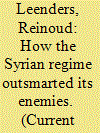

|
|
|
|
|
| Publication |
2013.
|
| Summary/Abstract |
The Assad government watched how uprisings unfolded in Tunisia, Egypt, and Libya, took stock of international reactions to these events, and, in response, developed strategies to maximize its probabilities of survival.
|
|
|
|
|
|
|
|
|
|
|
|
|
|
|
|
| 2 |
ID:
160109
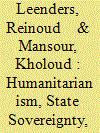

|
|
|
| 3 |
ID:
085190
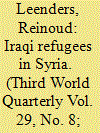

|
|
|
|
|
| Publication |
2008.
|
| Summary/Abstract |
This article explores the implications of the Iraqi refugee crisis for Syria, which is believed to host up to 1.5 million Iraqi refugees. Many policy makers, activists and analysts, sometimes inspired by the conflict repercussions of refugee crises witnessed elsewhere, have warned against the regional security impact of the Iraqi exodus and consequently speculated about a possible spillover of the armed conflicts in Iraq to its neighbours. The article presents an analysis of the characteristics and composition of the Iraqi refugee population and provides an assessment of responses to the refugee crisis in Syria. Its main finding is that fears for a spillover of Iraq's violence cannot be corroborated. The relative absence of refugee violence can be explained in reference to Iraqi refugees themselves. Given their specific demographic and social traits (including age composition, educational levels and professions, and to some extent religious affiliation), in addition to refugees' sectarian segregation, an overwhelming majority of Iraqi refugees are and remain victims of the violence in Iraq; they are unlikely to become its perpetrators abroad.
|
|
|
|
|
|
|
|
|
|
|
|
|
|
|
|
| 4 |
ID:
060192


|
|
|
| 5 |
ID:
078939
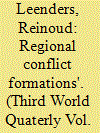

|
|
|
|
|
| Publication |
2007.
|
| Summary/Abstract |
Iraq is plunging into civil war, politics and violence in the Middle East are increasingly perceived to be highly interconnected and entwined. This article offers an attempt to understand the nature and scope of this regional interconnectedness involving three of the region's states - Iraq, Syria and Lebanon. Its approach takes advantage of the work by scholars of other regions than the Middle East, more precisely those analysing the 'new wars' and 'Regional Conflict Formations (rcfs) of primarily Central and West Africa and the Balkans. The article suggests that, provided some methodological problems are addressed or at least acknowledged, the rcf model offers a useful approach to studying and addressing this region's multiple conflicts. Its assessment of the rcf model's utility in reference to the Middle Eas - broken down along the suggested levels of military networks, political networks, economic/financial networks and social networks - suggests that its emphasis on material - physical linkages neglects important symbolic - political resources that easily cross borders and are equally determining in fuelling and framing conflicts. This lacuna is echoed in US policy making toward the Middle East. The article concludes that, in order to avoid myopia in both analysis and policy making, such more discursive processes ought to be integrated into and made complementary with the rcf conceptualisation of conflict-related cross-border traffic. This will also allow for better analysis of the complexity of identity politics and it underscores the fallacy of assumed Western exogeneity to this region's conflicts
|
|
|
|
|
|
|
|
|
|
|
|
|
|
|
|
| 6 |
ID:
124606
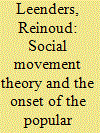

|
|
|
|
|
| Publication |
2013.
|
| Summary/Abstract |
This article takes stock of my attempt to scrutinize the onset of the Syrian uprising with the help of some key analytical concepts derived from social movement theory, including "opportunity" and "threat," "social networks," "repertoires of contention," "framing," and "diffusion." These tools allow me to identify and disentangle the mechanisms of early mobilization and the uprising and explain why they commenced in relatively peripheral areas. Social networks and framing processes are argued to have been key in mobilization, by transmitting opportunities derived from the "Arab Spring," by mediating the nexus between repression and mobilization, by creating and feeding a rich new repertoire of defiant protest acts and claims-making, and by aiding the diffusion or agglomeration of mobilization throughout the country.
|
|
|
|
|
|
|
|
|
|
|
|
|
|
|
|
|
|
|
|
|